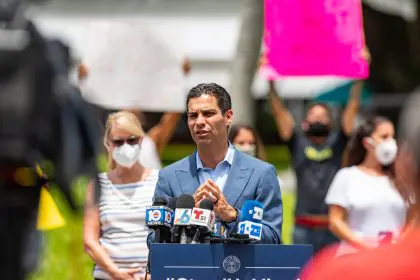On Apr. 11, 2021, Daunte Wright, a 20-year-old Black man, was tragically killed during a traffic stop in Brooklyn Center, Minnesota. This incident occurred just ten miles from where George Floyd was murdered by former police officer Derek Chauvin. Wright’s death was caused by police officer Kim Potter, who mistakenly drew her service pistol instead of her taser, leading to a fatal shooting. The aftermath of this incident has sparked outrage and calls for accountability, especially considering Potter’s lenient sentencing.
Kim Potter’s sentencing and public outcry
Potter was sentenced to just two years in prison for her role in Daunte Wright’s death, a sentence that many viewed as insufficient given the severity of the crime. After serving only 16 months, she was released, which has led to further public indignation. The Wright family, particularly Daunte’s mother, Katie Wright, has expressed their deep dissatisfaction with the justice system’s handling of the case.
In a statement to AP, Wright stated, “I think that Kim Potter had her second chance. She got to go home with her children. That was her second chance. We don’t have a second chance to be able to bring our loved ones back.” This sentiment resonates with many who believe that police officers often escape the full consequences of their actions.
The controversial speaking tour
In a shocking turn of events, Potter is going on a speaking tour to discuss her experience and the “mistake” she made. This initiative has been met with outrage, particularly from the Wright family, who feel that Potter is attempting to profit from her crime. The situation is further complicated by the involvement of Imran Ali, the prosecutor who initially sought to convict Potter. Ali resigned from the case, citing a toxic environment and partisan politics, yet he is now helping Potter with her speaking engagements.
Although Ali did not say how much money Potter would earn from her speaking engagements, it is confirmed that she is receiving compensation for presenting at law enforcement conferences.
Public reaction to Potter’s plans
Many community members and activists are appalled by the idea of Potter profiting from her actions. They argue that there are countless ways for her to seek redemption that do not involve monetizing the death of a Black man. The contracts for her speaking engagements suggest a focus on law enforcement’s challenges rather than genuine reform. Critics argue that this approach shifts the narrative away from accountability and justice for victims of police violence.
The need for reform and accountability
The discussions surrounding Potter’s speaking tour highlight a broader issue within law enforcement: the need for systemic reform and accountability. Many advocates argue that police officers must be held to a higher standard, especially when their actions result in the loss of life. The language in Potter’s speaking engagements raises concerns about the message being sent to law enforcement officers across the country. Instead of focusing on the importance of accountability, it appears to reinforce a narrative that justifies excessive force.
Community response and activism
Public protests: Activists have organized protests to voice their opposition to Potter’s speaking tour and the perceived injustices in the legal system.
Support for the Wright family: Many community members are rallying around Daunte Wright’s family, advocating for justice and reform in policing practices.
Calls for legislative change: There are ongoing discussions about the need for legislative changes to ensure greater accountability for police officers involved in fatal incidents.
A call for justice
The case of Daunte Wright and the subsequent actions of Kim Potter serve as a stark reminder of the ongoing issues of police violence and accountability in America. As Potter seeks to capitalize on her past, the community continues to demand justice for Wright and all victims of police brutality. The fight for reform is far from over, and it is crucial that the voices of those affected by these tragedies are heard and amplified.
As we reflect on these events, it is essential to remember that accountability is not just about punishment; it is about ensuring that such tragedies do not happen again. The legacy of Daunte Wright must be one of change, justice and a commitment to a safer future for all.















